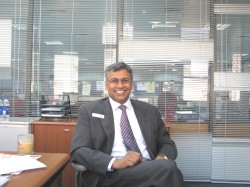The General Manager and CFO of National Bank of Oman, Humayun Kabir, gave a detailed overview of his bank’s operations, future prospects, paid capital and shareholders. He also spoke about the bank’s main competitors and Kabir gave his opinion regarding the banking sector in Oman and the effectiveness of the Central bank. Then he also answered a question on both the local and foreign competition in the banking market.
Kabir gave a detailed overview of his bank saying that the National Bank of Oman is "at an interesting stage of its development, from the perspective that the bank has rebounded sharply from the difficult period in the early part of the decade. It took the bank a couple of years to re-establish its foothold and is now entering into an aggressive growth phase."
"We are at the moment the fastest growing bank in Oman, particularly in terms of expansion of our retail footprint. We have opened eight branches in the last eight months, and around 45 ATM machines have been added to our network in the last year. We have established a new call center and launched a wealth management business called Sadara, which will be the first of its kind in Oman. We also just rebranded ourselves. We are very aggressive in the deposit market in particular in the low cost deposit segment."
With respect to the mega projects of national importance, we continue to play an active role. We are very supportive of key projects like Dukum. These projects are central to Oman and very important to us, the "National" bank of Oman. Currently, the main challenge for banks like us in funding these projects is the very elevated cost of funding in the international markets. One of the key impacts of the financial crises on local banks has been the availability and cost of long term funding in the international markets. We are actively working with our clients to minimize the impact of the repricing of risk in the global markets. The only other limitation we have is our single obligor limits and we work with other banks to overcome such constraints. These projects and the government’s investment are increasing the confidence of our citizens and foreign investors in the strength and stability of Oman’s economy and its bright future.
Our paid up capital is OR 108 million, and it is the highest in the market. In terms of market capitalization, the bank stands at about OR 350 million. Our largest shareholders are the Commercial Bank of Qatar owning 35% of our bank followed by the Suhail Bahwan Group which owns 15%. We have also a number of local pension funds as our major shareholders. The Commercial Bank of Qatar also has a Management Services Agreement with our bank and has been a partner and catalyst in the resurgence of NBO over the last 3 years.
Our primary goal is to be the best bank in Oman from the perspective of our shareholders and customers. We are the second largest bank in the Sultanate. We prefer to grow organically. As a comprehensive universal bank, we do corporate, investment and retail banking. We have five branches in Egypt and one in the UAE. Our plan for 2009 is based on a quarter to quarter review and re-calibration as the current global situation makes it very difficult to forecast with any certainty. We are cautiously optimistic but waiting to see how events unfold across the world."
Concerning their main competitor, Kabir explained "Bank Muscat is a well respected organization in Oman. Their growth has been primarily fuelled by acquisitions and more recently due to the rapid expansion of the Omani banking sector. As a competitor, we respect their capabilities. We enjoy the healthy competition in the market and the constant strive towards the development and advancement of the Omani banking sector."
Kabir gave his opinion regarding the banking sector in Oman and the effectiveness of the central bank, saying: "When I came here from Canada, a very prudent regulatory jurisdiction, I was pleasantly surprised by how pragmatic and far-sighted the regulations in Oman are and how stable their banking sector is. A lot of credit for that goes to the central bank that is very proactive and regulates the market effectively. It is therefore of little surprise that in the current financial crises, no bank in Oman required any significant bailout or support, as they all were doing relatively well under the circumstances. Additionally, the central bank in Oman has been keeping pace with global best practices in term of new regulations and effective governance. The standards in Oman are very high and all in all they have one of the most progressive banking sectors in the region."
Humayun Kabir then answered a question on both the local and foreign competition in the banking market in Oman saying that competition is increasing, as more and more foreign banks are opening new branches. He, however, feels that they can only compete in certain sectors and niche markets. So far, the foreign banks have around a 15% share of Oman’s market. "We do not see them as a direct threat as they cannot compete with our national branch network. The most important factor for our customers is access and convenience, and that is very difficult to do with three or four branches that the foreign banks have. In the long run, I believe that it is very hard for single branch operations to make money in a new market. Either you go in, in a meaningful way or not go in at all. Meanwhile, in the short term, competition amongst the local and foreign banks has risen significantly, as all are fighting aggressively for a bigger market share and keeping us on our toes. We are, however, confident that size, distribution, brand and the depth of our organization will help us enhance our market position."










